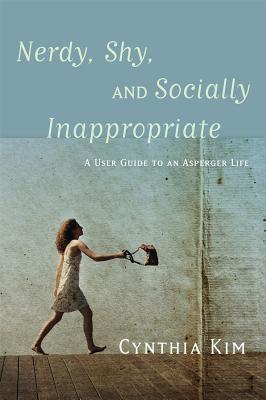 One of the presents on my Christmas list this year was a book about living with Asperger’s syndrome. Nerdy, Shy, and Socially Inappropriate: A User Guide to an Asperger Life was written by Cynthia Kim, a woman who was diagnosed with Asperger’s syndrome in her forties.
One of the presents on my Christmas list this year was a book about living with Asperger’s syndrome. Nerdy, Shy, and Socially Inappropriate: A User Guide to an Asperger Life was written by Cynthia Kim, a woman who was diagnosed with Asperger’s syndrome in her forties.
I’ve really enjoyed learning about other Aspies’ stories and experiences, and seeing the similarities to and differences from my own story as a man diagnosed with Asperger’s in my late twenties and still learning about it in my thirties. I haven’t posted much on this blog for a few years, but I have been writing reflections giving my responses to other books like this one– it’s just that I’ve been sharing them with my girlfriend Megan rather than posting them here. It’s been fascinating getting to hear her perspective too, as I’ve never come across anyone else whose thinking patterns were so similar to mine!
I figured that I’d share some of my reflections with Megan as I read Cynthia Kim’s book, but I also wanted to get back to posting on this site, so I figured I could do both at once! I’ll share about the parts of the book that stand out to me as insightful or that make me think of stories from my own life, and others are welcome to post their comments and questions– including Megan, of course! : )
So, I’ll go ahead and look at the first chapter. (One of the things that is annoying about my obsessively ordered brain is that I always feel like I have to write a big introduction to everything placing what I’m saying in context– it’s one of the reasons I don’t like writing.)
Like me, Cynthia Kim grew up before anybody had defined Asperger’s syndrome or knew anything about it.
For the first few months after learning about Asperger’s I spent a lot of time playing “What if…?”
What if I’d been diagnosed earlier? What if I’d been given the type of supports and accommodations that children on the spectrum receive today? Of course, it’s impossible to know how my life would be different.
I’ve certainly thought about those questions myself. To be honest, though, I have a hard time imagining myself growing up a different way than how I did. If I had known I had Asperger’s, I might have been less hard on myself for the social skills I struggled to learn. But I fear that, if I’d had that Asperger’s label to fall back on, I might not have tried as hard to achieve what I did while I was in school. By God’s grace, I had a wonderful group of classmates who accepted me as I was, even when I was a bit strange, and that bore fruit in a wonderful senior year when I finally opened up to forming friendships with them and found that I enjoyed it! Would that still have happened if I’d thought of myself as “autistic” rather than just “smart, shy, and awkward”? I don’t know.
At the same time, those labels of being “smart” and “shy” affected the way I thought about myself all the way on into adulthood. I really identify with Ms. Kim’s description of her internal reasoning about growing up:
Because I was quiet and did well academically, the adults in my life attributed my difficulties to extreme shyness and timidity. I’d grow out of it eventually and all of my problems would be solved. That explanation carried me into adulthood, where in the back of my mind I was waiting to magically outgrow my social and communication difficulties.
[…]
Decades passed and there I was, still waiting for someone to give me the secret handbook that would explain all those social nuances the people around me seemed to instinctively grasp.
Wow; that is exactly how I felt! I even told my Mom I wanted an “instruction book” that would tell me how to be an adult, because I was nearing the end of my school years, and we still hadn’t covered it.
The assumption is that the shy, quiet boy or girl is just maturing mentally or physically faster than they are socially, and before long, they will “catch up” and it will all even out. That can be true in some cases; all you need to do is be patient, and time will solve the problem.
But in my case, the difficulty I have with social skills are due to the way my brain is configured– it is a learning disability. That doesn’t mean I can’t learn social skills, but it might mean I will have to find a different way of learning them, and using them might never feel quite “normal.” I’m still working on that every day, and it’s not because I’m dumb or lazy!
It’s taken several years for me to “unlearn” the thinking I’d built up that my struggles were my own fault– thankfully God and my parents have been patient! It’s really been a rewarding time of learning and growing for me. I think another quote from Kim describes this sort of thing well.
Since discovering that I’m on the spectrum, I’ve been blogging about my experiences, processing what it means to suddenly be autistic at 42. In a way, I’ve been forced to relearn how to be me. All the things I thought were broken or defective or weird about me? It turns out they’re perfectly normal for people like me. Even more exciting? There actually are other people like me. Lots of them.
I felt like I spent a while after my diagnosis trying to figure out who I am in light of it. And I’ve had the joy of meeting one of those other people like myself. I’m so thankful I met Megan– I’ve learned so much from her and had a lot of fun at the same time!
Anyway, hopefully it won’t be too long until my next book reflection.

 One of the presents on my Christmas list this year was a book about living with Asperger’s syndrome. Nerdy, Shy, and Socially Inappropriate: A User Guide to an Asperger Life was written by Cynthia Kim, a woman who was diagnosed with Asperger’s syndrome in her forties.
One of the presents on my Christmas list this year was a book about living with Asperger’s syndrome. Nerdy, Shy, and Socially Inappropriate: A User Guide to an Asperger Life was written by Cynthia Kim, a woman who was diagnosed with Asperger’s syndrome in her forties.